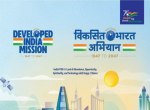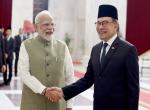The one single tract which guides our democracy is the Constitution of India. The Preamble of the Constitution establishes two specific conditions of government in India. First and foremost is the statement that sovereignty vests in the people and the right to make and unmake the Constitution also vests in the people. Secondly, the Preamble lays down the mandate for those who are required to work for the people in accordance with the Constitution. Those who aspire to be leaders of free India must always bear in mind that leadership itself emanates from the mandate given by the people and that their ultimate accountability is to their sovereign, the people. Leadership, therefore, in the Indian context is not a function of the power which vests in the leader, but rather an understanding of the mandate given to him and then using power of leadership to fulfill this mandate. It is on how power is managed that the success or failure of leadership will depend.
There are two views which can be taken of power, one being that power gives the authority to rule or the right to command. This places the person having power above the people over whom such power is to be exercised. This is as good a definition as any of an autocracy or a dictatorship. The second view is that power is the ability to do anything, an energy or a moving force that can be enjoyed only for the purpose of doing things for people for whose service the wielder of power is employed. Depending on how one views power, it is either a means of exploitation or an instrument of public welfare. Leadership, or the wielding of power in the Indian context, specifically demands that power be an instrument of public welfare and equally specifically prohibits the use of power as a means of exploitation. Is this how leadership has developed in India or how power is wielded?
That India is a welfare State is established by the Preamble, which gives every citizen the inalienable right to justice, liberty, equality and fraternity and demands that those who are set in government above us shall make these their fundamental duty. Part III of the Constitution lists the fundamental rights of citizens, the sum total of which is their welfare and happiness. Part IV of the Constitution lays down the Directive Principles of State Policy and through Article 38 directs that the State must secure a just social order for the promotion of the welfare of people. In some ways Article 38 is the pivot of the Constitution, the real kernel, the very core in that welfare of the people now becomes the paramount function of the Constitution and the primary duty of our leaders.
The present form of government has not risen only out of the Constitution but is only the culmination of a long history of government, without which one of the oldest civilisations in the world would not have survived. Both the Mahabharata and the Ramayana enshrine the traditional concept of government and the King, or leader. The ancient Indian concept of power is embedded in the principle of dharma, which means right thinking and right action, among other things. Thus justice, rule of law and good governance would form part of dharma whereas injustice, tyranny and anarchy would be the attributes of the opposite of dharma, adharma. The Sabha Parva of the Mahabharata emphasises that good leadership and good governance can only be provided when the leaders who make justice, rule of law and good governance their guiding star are set in a position of power. The basic principle of dharma applies to every form of government which has the welfare of the people at heart, be it a democracy or a benevolent dictatorship. Only he has the right to lead who eschews greed for wealth, avoids the disorders of sloth, hardness of feeling and procrastination and bears the welfare of the people always at heart. A person, who lacks faith, is a habitual liar, is careless, puts off decisions, keeps bad company and angers easily, does not consult his colleagues and is corrupt, is not really a leader. Leadership and dharma go hand in hand. In fact in the matter of government the Mahabharata is an extraordinary document and the Sabha Parva, Anushasan Parva and Shanti Parva of this greatest epic ever written form the core of government. The Gita, which is only a battlefield exhortation by Krishna to Arjun, is so powerful that it has become one of the core scriptures of the Sanatan Dharma.
The Sabha Parva, Anushasan Parva and Shanti Parva are presented in the form of conversations between Narada Muni and King Yudhishtira. Narada asks Yudhishtira, “I hope that it is after you have conquered your own self that you expect to conquer others?” (Sabha Parva 5.126) Consider the gravity of the question. A person not in control of himself cannot lead others.
Narada goes on to ask, “Do you assign to the ministers who are above reproach, behave as their forefathers did and are distinguished, the works of the realm that are of the greatest import?” (Sabha Parva 5.37). Certainly A. Raja, Suresh Kalmadi and many of the ministers of the Central and State Governments would not come within the definition of good ministers given by Narada.
The pronouncements of the Mahabharata on the quality of governance are quite extraordinary. For example, “Let the King discipline himself. Only then must he discipline his subordinates and subjects: for that is the proper order of discipline” (Anushasan Parva 212.12). What should the ruler who is required to discipline himself be like in his personal conduct? To quote, “The interest of all his subjects alone is his interest, their well-being is his well-being, what is pleasant to them is pleasant to him and in their good lies his own good. Everything he has is for their sake: for his own sake he has nothing” (Anushasan Parva 212.26). Compare this with our greedy, self-seeking and corrupt ministers of today, who have forgotten that power is to be used for promoting the welfare of the people and not to add to their strength as predators preying on the people. In this behalf one further quote is required, which sums up how power is to be exercised, “The power of governance is to be exercised in accordance with dharma and not arbitrarily” (Shanti Parva 122.40). Had those in power heeded these words there would be no 2-G scam, nor would the Commonwealth Games shenanigans have occurred.
The Mahabharata of today’s India is the Constitution. The Indian Constitution is all about leadership because it recognises that there is the State, there are three organs of the State, the Legislature, the Executive and the Judiciary, that each of these organs has a constitutional duty to perform and that in each organ there is a leadership. For the Legislature leadership is provided by the political parties, each of which is required to have an ideology and a programme according to which it will perform in the Legislature. The Executive has the leadership of the Council of Ministers and it is the permanent Executive, or civil servants, who will implement policy as prescribed by the leadership and in doing so the senior officers will provide guidance and leadership to their juniors. In the judiciary it is the hierarchy led by the Supreme Court which will provide guidance to all courts and all judges. The Supreme Court and the High Courts provide judicial leadership.
In government unless there is ideology and programmes based on that ideology which are at the back of every political decision, there can be no policy. When there is no ideology there is no benchmark against which our leaders can compare themselves. This means that all policies will be ad hoc. All ad hoc decisions are by their very nature based on some immediate expediency and not on a programme which has specific goals. Without specific goals there can be no governance and where there is no governance there is corruption, anarchy and breakdown of the rule of law. In such a situation there can be no leadership. This is further compounded by the fact that we have entered an era of coalitions in which new permutations and combinations are formed within the Legislature in order to achieve power. Coalitions are based only on self-interest which is always short-term and government soon gets divorced from any ideals of public welfare. In such a situation it is but natural that the largest party within the ruling coalition can talk of the dharma of coalition when it really means that the perceived compulsions of coalition justify total inaction even when one member of the coalition is acting in a corrupt manner and in violation of all norms of public probity. The excuse for inaction against such a person is virtually a shrug of the shoulder and an unsaid statement, “What else can we do if we want to survive?” The purpose of a democracy is not that government should survive but rather than it should provide good governance to the people who have voted it into power. Because there is no leadership there has been a total collapse of government in this country.
Post 1967 India has seen the rules of politics change in which public welfare is replaced by greedy self-interest. About today’s so-called leaders one can say that a large number of them are greedy, have no sense of moral shame, are arbitrary, whimsical and prone to breaking the law, are manipulative, intriguing and thoroughly corrupt and they look upon the State as their own private property. Many of them in fact are criminals. One looks at leaders as people who are at least consistent in what they say and how they act. There is a saying in Gujarati that the three most unpredictable things in the world are raja, vaja and vandra, that is, king, musical instrument and monkey. The raja being an autocrat is unpredictable in his behaviour, diktats and whims. A musical instrument played by some one totally untrained makes weird noises and we cannot say what will emerge by way of sound. A monkey swings from bough to bough, jumps hither and thither, snatches a banana from one’s hand and generally plays the fool. Our modern day politicians are exactly like the raja, vaja and vandra combined. This is not the best recipe for providing leadership. There is the saying about heroes who are forgotten, “They died unwept, unhonoured and unsung”. About our modern day leaders I would say, “They live unkempt, unwashed and unhung”.
How should our leaders be? I can but quote a few lines from Lord Houghton’s poem, “The Men Of Old”. To quote
“To them was Life a simple art
Of duties to be done,
A game where each man took his part,
A race where all must run”.
Such a leader must be of the type about whom Sir Henry Wotton has written in his poem “The Character of a Happy Life”
“Who hath his life from the rumours freed;
Whose conscience is his strong retreat;
Whose state can neither flatterers feed,
Nor ruin make oppressors great”
None of our present leaders measure up.
---------------------------------------------
Published Date: 10th October, 2011









Post new comment